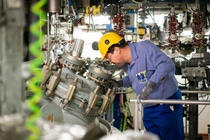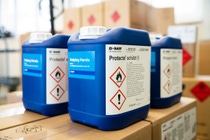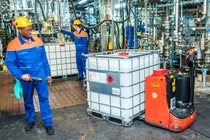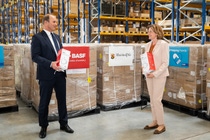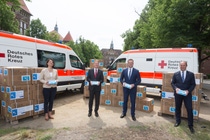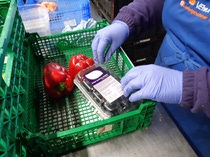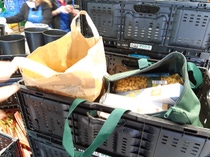BASF takes stock of coronavirus aid measures during the Helping Hands campaign
- Around 1 million liters of disinfectant delivered free of charge worldwide, around a quarter of it to hospitals, doctors and municipalities in the Rhine-Neckar metropolitan region
- More than 100 million protective masks donated to the Federal Republic of Germany and more than 1 million to the State of Rhineland-Palatinate
- Coronavirus aid fund and assistance for food banks and people in urgent need
BASF is pleased with what it has achieved with its “Helping Hands” campaign. The coronavirus aid measures have included a huge range of activities – from producing and donating disinfectant and donating face masks and protective equipment to providing assistance to food distribution organizations and individuals in urgent need due to coronavirus in the Rhine-Neckar metropolitan region. “The demand for hand sanitizer was huge at the beginning. We provided aid quickly and unbureaucratically by starting up production of hand sanitizer at the Ludwigshafen site and many others around the world. There is now no longer a shortage of hand sanitizer and, fortunately, demand has been decreasing significantly for some time now. That shows that our assistance was effective and provided help where it was needed,” said Michael Heinz, member of the Board of Executive Directors of BASF SE and Site Director of Ludwigshafen.
Hand sanitizer for the fight against corona
In Europe alone, BASF has produced and donated more than 900,000 liters of disinfectant (including around 750,000 liters in Germany) since it began deliveries in March 2020. Of this, 275,000 liters have so far been supplied within the Rhine-Neckar metropolitan region. This fired the starting gun for the Helping Hands campaign. As part of the campaign, the company received exemptions from the State of Rhineland-Palatinate to produce hand sanitizer – a product that is not usually in BASF’s range, but was produced especially for the campaign. BASF initially delivered the disinfectant to regional health providers in the Rhine-Neckar metropolitan region in order to support the fight against coronavirus: hospitals and doctors, later also care homes, schools, daycare providers and sports facilities. By mid-April, BASF had also created the technical facilities to use bio-ethanol as a starting material and gained approval from the authorities. Most of the resulting extra quantities were then distributed free of charge throughout Germany via the German Chemical Industry Association (VCI) online platform. The platform had been put into operation in April and suspended a few days ago due to a fall in demand in Germany. BASF has also suspended production of disinfectant.
Support with protective masks and other protective equipment
Along with disinfectants, there were also significant shortages of protective masks. In its Helping Hands campaign, BASF donated more than 100 million protective masks to the Federal Republic of Germany and more than 1 million FFP2 masks to the State of Rhineland-Palatinate. “We were happy to support the federal and state governments in procuring masks and other protective equipment. In doing so, we were able to make use of our existing procurement networks in Asia and our logistics capabilities. We are delighted that our contribution has assisted in the easing of the situation that we are now seeing,” said Michael Heinz. In many other regions, too, BASF has supported local health facilities by donating masks, protective eyewear, protective clothing and materials for the production of visors.
Assistance initiatives and programs for those in need
Set up by BASF SE and the BASF Stiftung especially to tackle the coronavirus pandemic, the assistance fund has played a crucial role in supporting food distribution initiatives such as food banks in the Rhine-Neckar metropolitan region in particular. “At the start of the pandemic, many food banks were forced to suspend their vital work. Donations from our fund and substantial material and logistics support have now allowed most food banks in the region to reopen. For example, our site logistics team was able to broker a shipping container from the Mannheim port for the Frankenthal food bank, which urgently needed it for storage. We were also able to put the Bensheim food bank in touch with a charity whose volunteers were sewing masks. That has now blossomed into a long-term collaboration. Helping people to help themselves in this way is exactly what the coronavirus fund was set up to do,” said Michael Heinz. BASF SE had provided more than EUR 100,000 to the assistance fund – money that has now all been spent and distributed in form of individual donations. Institutions, individuals and BASF employees were also able to support the fund with their own donations. Around EUR 20,000 in donations have been received to date. The BASF Stiftung has used this to provided assistance to those who have suffered long-term loss of income due to coronavirus illness or whose households are in financial distress as a result of the pandemic. As the financial impact of coronavirus on individuals and households is expected to continue for some time, the Stiftung will continue to examine applications for assistance and provide financial assistance from donations in cases of verified need. Applications can be submitted to wirhelfen@basf.com.
Enormous commitment and further aid initiatives
“I am so proud of the energy and willingness to help shown by the entire BASF team, be it in the plants, in the office or when working from home. Helping Hands started small and with almost no advance notice. So many colleagues from a huge range of disciplines and departments immediately and willingly got involved to continuously expand the project, making it a success on many levels. They deserve our respect and enormous gratitude,” emphasized Michael Heinz. “I would also like to thank the external helpers, suppliers and contractors who have played a crucial role in advancing this project.”
“The immediate demand for disinfectant and masks has now been met, allowing us to close some of the initiatives we had set up at such short notice. But the coronavirus pandemic will only be over when a vaccine is available. Here, too, we are doing our bit with our research teams and the BASF supercomputer Quriosity,” Michael Heinz added.
P-20-237

